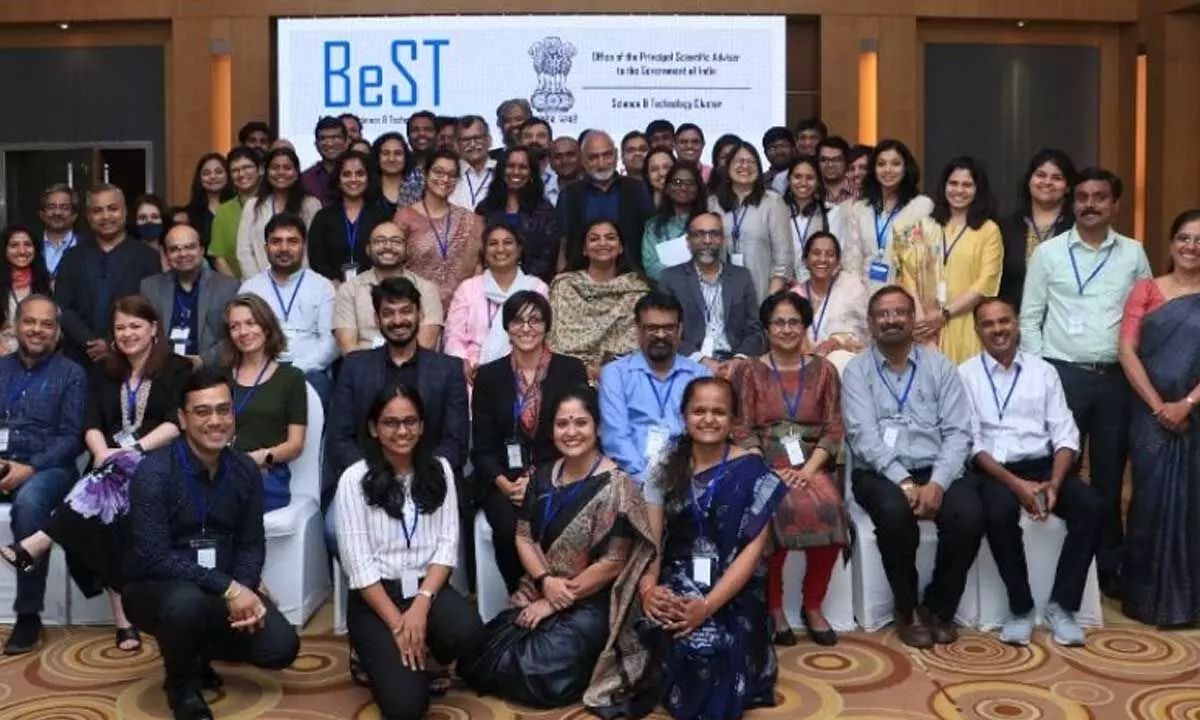Live
- Global Indian Pravasi Kabaddi League unveils 12 teams for inaugural season
- Indian Inc hiring will see uptick in 2025 in sectors like AI, data analytics: Report
- South Korea plane crash: Eyewitnesses report sparks in engine, bird strike; death toll mounts to 127
- Four Pubs in Jubilee Hills Denied Permission by Police
- Chandrababu Congratulates Koneru Humpy on World Rapid Chess Championship
- FairPoint: Welfare schemes or Ponzi tactics? Red flag on Kejriwal’s election game plan
- Radiance of Indian culture spreading to every corner of world, says PM Modi
- Railway projects worth Rs 88,875 crore sanctioned in big boost to 3 economic corridors
- Swati Maliwal inspects Delhi's IHBAS Hospital, shares 'grim realities' of AAP's healthcare claims
- Two-way traffic restored on Srinagar-Jammu national highway
Just In
'One Health Bengaluru City Consortium' launched


‘One Health Bengaluru City Consortium’ launched
One Health is a multi-sectoral approach that takes into consideration human, animal, and environmental health and the interconnectivity and interdependence of these three elements
Bengaluru: Bengaluru Science and Technology (BeST) Cluster, located in the Indian Institute of Science (IISc) Campus, an initiative of the Office of the Principal Scientific Adviser to the Government of India, focuses on 'One Health' among other themes. One Health is a multi-sectoral approach that takes into consideration human, animal, and environmental health and the interconnectivity and interdependence of these three elements.
The BST cluster launched the 'One Health Bengaluru City Consortium' as a significant first step towards the goal of integrating existing one health efforts, facilitating collaboration, and building a one health framework for the city of Bengaluru. Representatives from 25+ organizations consisting of researchers, academicians, technologists, industry experts, practitioners, policymakers, city planners, health authorities, not-for-profit organizations, and civic officials were gathered for the launch of the One Health Bengaluru City Consortium on March 3 with a goal toward integrating existing one health efforts, facilitating collaboration, and building a One Health framework for the city of Bengaluru.
Dr.Sindura Ganapathi, Visiting Fellow, One Health Mission, Office of the Principal Scientific Adviser (OPSA) to the Government of India joined virtually to deliver the keynote address. Explaining the One Health Mission of OPSA, he pointed out the lack of existing models worked out for implementing One Health in cities and districts. He expressed that the way forward for the wastewater-based epidemiology project that impacted the rapid response of BBMP in Bengaluru, now adopted as a pilot for the One Health Bengaluru City Project by BeST Cluster, would be to go beyond COVID to other region-specific diseases, and the learnings used to develop models for other cities.
During the launch, the Special Health Commissioner, Bruhat Bengaluru MahanagaraPalike (BBMP), Dr. K V Thrilok Chandra, addressed the gathering. He emphasised the importance of putting in place a systemic mechanism to quickly capture and respond to emerging diseases and the necessity for scientists and technology players to collaborate and collate information. BBMP has already established the 'One Health Cell', set aside significant seed capital in the current budget for the same, and set up a Hi-Tech Laboratory and Metropolitan Monitoring Centre to capture the major disease parameters. He said, "We don't need another World War on the health front for us to wake up again."
A cross-sector panel consisting of stakeholders from science, policy, urban planning, medicine, and academic engagement discussed the priorities, challenges, and future plans for the One Health approach with respect to Bengaluru city.
The event also had speakers briefing existing consortium efforts on environmental surveillance, disease ecology, and stakeholder mapping with respect to One Health in Bengaluru.
"One Health Bengaluru City Consortium is being driven by disease ecology and environmental surveillance as an evidence-based approach for predicting risks to human and animal health. Cross-sector communication and cooperation between this multi-stakeholder partnership is a prerequisite in responding to emerging health crises", said Dr. Farah Ishtiaq, Principal Scientist, at Tata Institute for Genetics and Society (TIGS).
"Bengaluru is a huge urban center with interfaces between wildlife, livestock and commensals, and people. Additionally, rapid development and changing climate result in dependence of our health on ecology, the interactions between all these species, and their environment. We hope the One Health Bengaluru City can bring these ecological dynamics front and center for evidence-guided action for a healthier future," says Prof. Uma Ramakrishnan, National Centre for Biological Sciences (NCBS). Dr.Ishtiaq and Prof. Ramakrishnan have been the key drivers of the One Health concept in Bengaluru.

© 2024 Hyderabad Media House Limited/The Hans India. All rights reserved. Powered by hocalwire.com






